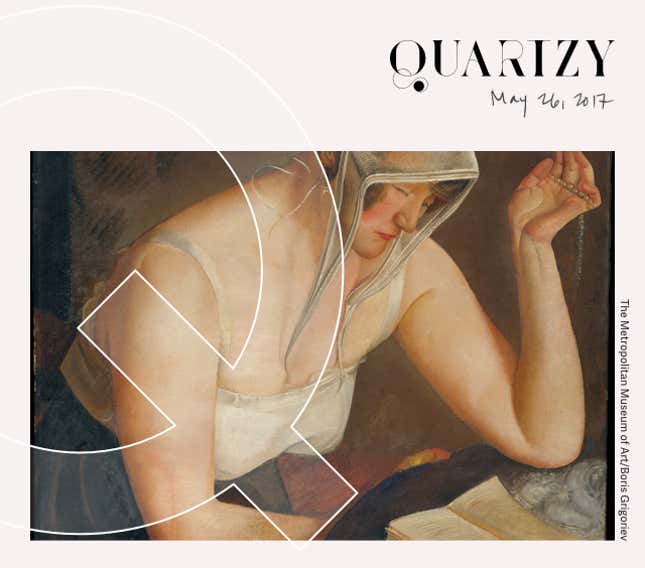
Happy Friday!
Thu-Huong Ha here, books and culture reporter at Quartz. I’m lucky enough to be filling in for Jenni this week.
It’s Memorial Day on Monday in the US, meaning the official start of the American summer social calendar. People tend to think of summer as a time of relaxation and escape. I strongly disagree. For me, summer is the season of FOMO, when people constantly seem to be asking, “Are we living our best lives?” Every Instagram photo serves as a reminder that you’re not making the most of the sunny weather. And every weekend, starting with the first, is a countdown to the last.
My advice? Stop planning activities to soak up every last Sunday through August. Once you’ve figured out your major logistics for the summer, your family vacations or flights to weddings, just say no to planning ahead. Also, take a healthy dose of skepticism when you look at Instagram.
And remember: Getting on a train or plane is only one kind of escape. You can also get away to another world, sprawled out on the pages of a book—or into the hushed, murmuring coolness of a bookshop.
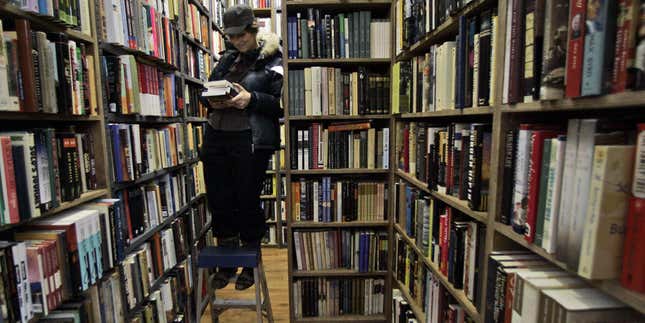
Perhaps that’s what I hoped for when I visited Amazon’s first bookstore in New York City this week, but I found the experience lacked that much-needed escapism. At its best a bookstore should do at least one of two things: provide a calm, charming place to wander around, free from your phone; or simply provide a book you want.
Amazon’s new physical bookstore (the seventh the e-commerce giant has opened since 2015) does neither. With its bewildering pricing system and data-driven shelving choices, it’s full of reminders of the digital noise rumbling around in our pockets. And quite frankly, it doesn’t have a lot of books, so it just doesn’t stack up against the deep reserves or efficient delivery of Amazon.com.
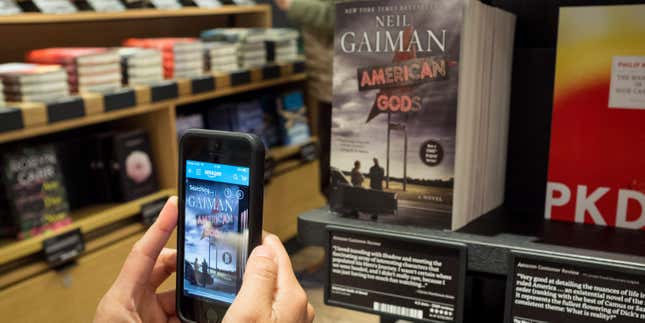
Instead, I’d recommend visiting one of the bookstores around the world lovingly illustrated by Bob Eckstein in the New Yorker last year.
Summer reading (and listening). In the summer, fiction and narrative nonfiction shine. Even Bill Gates, who usually likes to recommend math and science books, knows it. His summer reading list includes a rare novel this year—The Heart by Maylis de Kerangal—along with three fast-paced memoirs.
Among them is comedian Trevor Noah’s Born a Crime. The memoir by the Daily Show host is about his childhood in South Africa during and after apartheid. The title refers to the fact that Noah’s birth was the result of a criminal act: extramarital sex between his black mother and white father. “The book is ultimately an ode to his mother, a fierce and uniquely minded woman,” Gates writes. (Just say “badass,” Bill.)

I’d suggest you give the audiobook version, narrated by Noah himself, a spin. I’ve avoided listening to many books on audio, not wanting to turn the act of reading into a productivity hack. But Noah’s book is a really effective use of the form. It works particularly well because of his knack for accents.
In fact it’s Noah’s aptitude for languages and impressions that helped him survive as a kind of shapeshifter when he was a kid, in a society that marked him, a half-black, half-white boy, an outcast. And it later helped him rise to fame as a stand-up comedian.
A room of one’s own. After apartheid ended, Noah and his mother moved to a new house where he had his own room for the first time. “I didn’t like it,” he writes. “My whole life I’d slept in a room with my mom or on the floor with my cousins.”
Nighttime solitude may have been disconcerting at first to Noah, but it was also a luxury, and it still is to many. In 17th- and 18th-century Europe, sleeping alone was downright opulence, writes Nika Mavrody in the Atlantic.
Mavrody’s fascinating piece explores the societal disapproval of an activity I’ve indulged in since I was a wee one: Reading in bed.
“The four-poster canopy bed was invented during this period, and with it, the modern notion of privacy,” she writes. ”In a busy, one-room household, drawing the bed-curtains closed was a rare opportunity to be alone. And being alone created dangerous opportunities for transgression.”
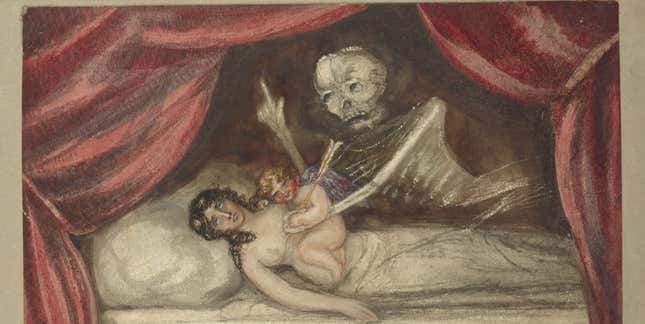
The nighttime transgression of reading in bed threatened societal cohesion in daylight hours, Mavrody writes. “People feared that solitary reading and sleeping fostered a private, fantasy life that would threaten the collective—especially among women,” she says. “The solitary sleeper falls asleep at night absorbed in fantasies of another world, a place she only knows from books. During the day, the lure of imaginative fiction might draw a woman under the covers to read, compromising her social obligations.”
That sounds pretty great to me.
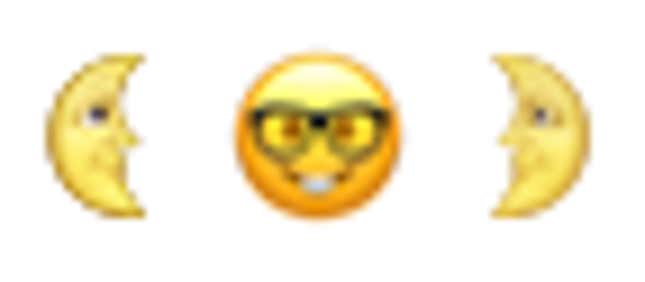
The places you’ll go. It’s graduation season, and many students celebrating their freedom from study (for the summer at least) will be congratulated with a somber tome instructing them on how to live a productive, impactful life.
If that’s your thing, that’s cool: Quartz has some suggestions from the CEO of Hyatt and the dean of Wharton, among others, as well as from reader-in-chief Bill Gates. Well-meaning aunts and uncles are buying up books like Dr. Seuss’s classic, Oh the Places You’ll Go, and William H. McRaven’s Make your Bed, based on his 2014 commencement speech, which are both on US bestseller lists this month.
But I say: Give the graduates a break. Let them go to the beach and read something juicy and meandering. The Savage Detectives, by Roberto Bolaño, comes to mind. For young wanderers, Kuma-Kuma Chan, by Kazue Takahashi, is great.
These books don’t teach you much about how to be your best you, but they’ll certainly take you on a little get-away.
Have a great weekend!

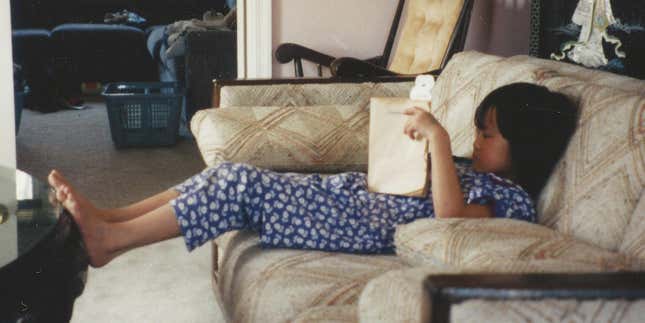
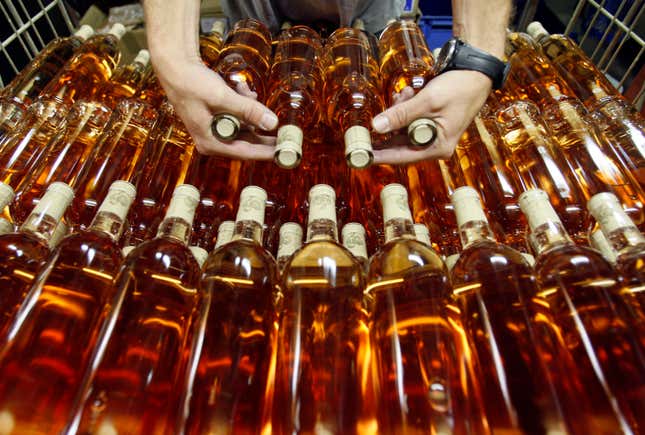
Yes way rosé. I recently had Txakoli (pronounced like “cha-ko-lee“) rosé for the first time.
Txakolis come from Basque and are clean, with high acidity, minerality, and salinity, meaning they’re good with seafood, cured meats, and fried snacks, says Serious Eats. The one I tried, from Getaria in Basque country, had a bit of fizz and a nice salty aftertaste that was like drinking the sea (if that were an advisable thing to do). Txakoli rosés are relatively unknown in the US, but they’re becoming more popular here in New York and elsewhere.
My first taste was two weeks ago, but one plan I’ll commit to for this summer is to try several more.